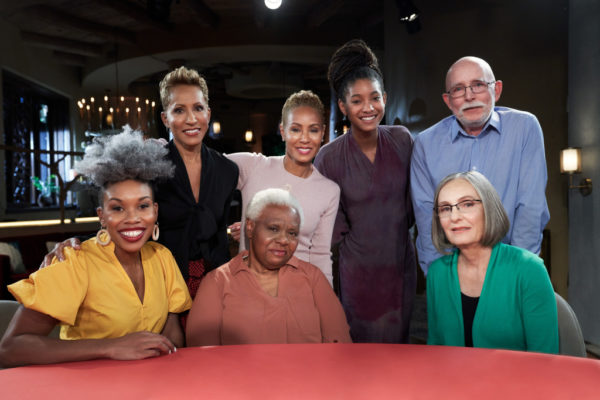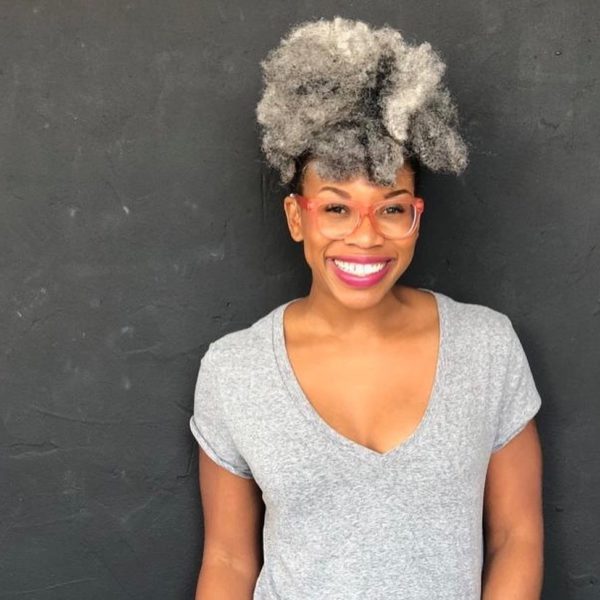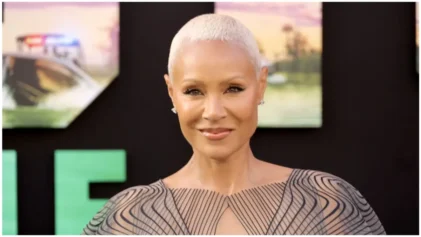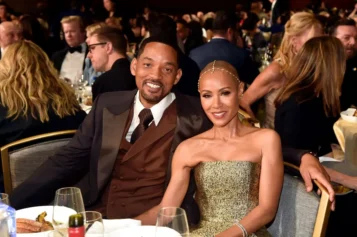Monday’s episode of “Red Table Talk” is one in which a Black transracial adoptee opens up about how disconnected she feels with the Black community. And it’s making for big chatter online.
Angela Tucker was adopted by a white couple when she was 13 months old after her mother, who was homeless, placed her up for adoption. David and Teresa Burt raised Tucker in their predominantly white town of Bellingham, Washington, after she became a ward of the state following her diagnosis with a form of cerebral palsy.

“I have no sense of strong identity. Being a transracial adoptee, it’s really difficult to share what we really feel because we have parents who raised us and love us and we don’t want to appear we’re not grateful for what they’ve done,” Tucker admitted on the Jada Pinkett Smith-hosted Facebook Watch show Oct. 21. “For me to talk about transracial adoption is to hurt somebody. … I’m alive but dead inside in some ways, not knowing my culture and not being connected.
“I don’t feel like transracial adoption is the right solution because essentially we’re asking me as a black woman to assimilate into white culture but to also keep my blackness even though I wasn’t raised within it,” she said, adding that she’s surprised when she looks into the mirror and sees a Black woman.
Tucker, who founded the adoption consulting firm The Adopted Life, admitted that she feels most comfortable around other transracial adoptees. She’s least comfortable around Black people and even admitted feeling “fear” when she met her birth mother and her family.
“This is my family, why am I afraid of my own family?” she wondered aloud. “I don’t identify with black folks because I feel my own sense of fear or illegitimacy is how I feel even sitting here with you because I feel like you three are legitimate black people because you were raised by black people. It’s embarrassing to say that, but that’s my reality,” she told Pinkett Smith, Willow Smith and Adrienne Banfield-Jones.
But Tucker hasn’t put any thought into how to assimilate with Black culture. She said she lives in a predominantly white neighborhood and is “trying to be OK with that right now.”
“I grew up in white spaces so it makes sense that I might feel safe here,” she adds. Despite the perception of her moving into “a better life,” Tucker admitted she still has the desire to be close to her birth mom, who does not have many material possessions.
She also opened up about the daily conflict of presenting as a Black woman while she doesn’t “feel like a Black woman.”
“A lot of people like myself, once we leave the house and no longer have white privilege by osmosis it’s like an awakening. I chose to go to a predominately white college because that’s what was comfortable for me,” she said.
“When I went to college, I did feel a lot of racism but it was coded in this way where I was put up on a pedestal — it was tokenism, being in an all-white school,” she went on. “I was always chosen to be on the college pamphlets. … I don’t know if they embraced me or they fetishized me. … I didn’t think of it as racism, at the time I thought it was, maybe, flattering, and then I started to realize what was happening.”

“Not having other people to bounce these stories off of was really tough, so that’s when I started thinking about my blackness,” she added. Through her firm, she educates adoptees and conducts discussions about feelings from the adoptee’s perspective, rather than the usual focus of the adoption conversation on adoptive parents. She also works on “helping adoptive parents humanize their children’s birth parents.”
However, the conversation turned when Pinkett Smith’s mom implores Tucker to do the same coaching work she does on white families for herself. Tucker admitted that she and her husband, who is white, foster white children because “that’s what I’m familiar with.”
“You’re telling other people to move into a black community, expose the child to black culture. You can do the same thing,” Banfield-Jones said. “It’s a tall order but it’s a tall order for a white person to do it for a black child. So as a black person to do it for a black child, it certainly, to me, would be a bit easier. Because you have some idea of what it’s like to be a black person in the world.”
“Right, but if that’s not my goal,” Tucker replied after Pinkett Smith noted it could be “a healing process.” “I’ve learned how to flourish in a white world.”
It was Tucker’s hesitation in exploring her own discomfort around Black people that struck a nerve.
“Gammy thank you for asking every question I wanted to ask! I pray this young lady learned something and understands she needs to heal. Self-hate seems to be flowing through this young lady”
“The young Lady seems to be PERPLEX on this video. She need to continual to listen to Jada and Grammy”
“Sounds like she was taught to fear black folks and embraced it…”


